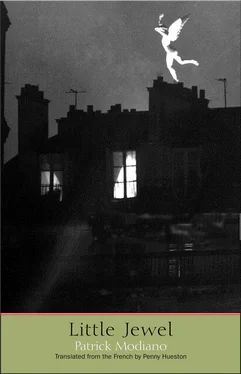She went into one of the apartment blocks at the far end, on the left. Each building had an entrance with a sign: STAIRCASE A. STAIRCASE B. STAIRCASE C. STAIRCASE D. Hers was Staircase A. I stayed outside for a while, waiting for a light to come on in a window. But I waited in vain. I wondered if there was a lift. I pictured her climbing Staircase A, clasping the cans. That image wouldn’t fade, even in the metro on the way back.
ON SEVERAL OTHER evenings, I retraced my steps. I waited on a bench at Châtelet at exactly the same time as I had first come across her. I was on the lookout for the yellow coat.
The barrier opens as the train leaves and the tide of passengers pours onto the platform. When the next train arrives, they’ll pile into the carriages. The platform empties, it fills again, and you let yourself drift off. With all the comings and goings, you no longer focus on anything precise, not even a yellow coat. A groundswell pushes you into one of the carriages.
I remember that, back then, the same poster was in every station. A couple with three fair-haired children all sitting round a table in an alpine chalet in the evening. Their faces were illuminated by a lamp. Outside, it was snowing. It must have been Christmas. Written on top of the poster were the words: PUPIER, THE CHOCOLATE FOR FAMILIES.
The first week, I went to Vincennes once. The following week, twice. Then twice more. There were always too many people in the café at around seven in the evening for anyone to notice me. The second time, I ventured to ask the chubby blond barman if the woman in the yellow coat would come today. He frowned without seeming to understand. Someone from another table called him over. I don’t think he heard me. But he wouldn’t have had time to reply. It was peak hour for him, too. Perhaps she wasn’t a regular at this café at all, and didn’t live in this neighbourhood. Perhaps the person she had called from the phone box lived in the brick apartment block and, that particular evening, she had been visiting and had brought cans of food. Later, she had taken the metro in the other direction, as I had also done, and she had gone home, and I would never know precisely where. My only point of reference was Staircase A. But I would have to knock on each door on each landing and ask whoever was prepared to answer whether they knew a woman, about fifty years old, with a yellow coat and a scar on her face. Yes, well, she had been there one evening the week before, after buying cans of food and a packet of coffee from the grocery store on the street. What could they possibly say to me? That I had dreamed it all up?
And yet, there she was again in the fifth week. Just as I was coming out of the entrance to the metro, I saw her in the phone box. She was wearing her yellow coat. I wondered whether she, too, had just left the station. So she might have regular commutes and timetables in her life…I had trouble imagining her holding down a day job, like everyone else on the metro at that hour. Châtelet station. It was a vague starting point for further clues. Tens of thousands of people wind up at Châtelet before scattering to all points of the compass. Their paths mingle and blur, once and for all. There are fixed points in this tide of people. I should not have been content to wait on one of the station benches. I should have spent time hanging around the ticket offices and newspaper stands, in the long corridor with the escalator, and also in the other corridors. People can be there all day, but you only notice them after they’ve become a predictable feature of the place. Homeless people. Buskers. Pickpockets. People who have lost their way and who will never go up to the outside world again. Perhaps she never left Châtelet all day, either.
I was observing her in the phone box. It was like the first time: she didn’t seem to have got through straightaway. She dialled the number again. She was speaking now, but the call was much shorter than the other evening. She hung up abruptly. She came out of the phone box and didn’t stop at the café. She continued along Avenue de Paris, still with the gait of a dancer, until we reached the Château de Vincennes metro. Why didn’t she get off at this stop, the end of the line? Because of the phone box and the café where she drank her customary kir before going home? And those other evenings when I hadn’t seen her? Of course: she must have got off at Château de Vincennes.
I had to speak to her, or she would end up noticing that someone was following her. I tried to think of the words. The fewest possible. I would extend my hand. ‘You used to call me Little Jewel. You must remember,’ I would say to her. We were approaching the apartment block and, as on the first evening, I couldn’t find it in me to address her. On the contrary, I let her draw further away. My legs felt heavy; I was filled with inertia. But also a sort of relief as her figure receded. That evening, she didn’t stop in the grocery store to buy cans of food. She crossed the courtyard of the apartment block, and I stayed behind the metal gate. The courtyard was lit by a single globe above the entrance to Staircase A. In that light, the coat took on its yellow hue again. She looked exhausted as she trudged, hunching slightly, towards the staircase. At that moment, the title of a picture book I used to read, when my name was Little Jewel, came back to me: The Old Circus Horse .
When she had disappeared, I went through the metal gate. On the left was a glass door with a sign stuck on it — a list of names in alphabetical order and, next to each name, the corresponding staircase. A light was on behind the glass. I knocked. In the half-open door the face of a woman appeared, a brunette, short hair, quite young. I told her that I was looking for a lady who lived there. A lady who was single and wore a yellow coat.
Instead of shutting the door, the woman frowned, as if she was trying to remember a name.
‘That must be Madame Boré. Staircase A…I’ve forgotten which floor.’
She ran her finger down the list. She pointed to a name. Boré. Staircase A. Fourth floor. I began to cross the courtyard. When I heard the concierge shutting her door, I did an about-turn and slipped out onto the street.
That evening, during the trip home on the metro, I kept thinking about the name. Boré. Yes, it was similar to the name of the man I had understood to be my mother’s brother, Jean Borand. On Thursdays, he used to take me to his garage. Was it just a coincidence? And yet my mother’s surname, as it appeared on my birth certificate, was Cardères. And O’Dauyé was the surname she had adopted as a sort of stage name. That was around the time when my own name was Little Jewel…
In my bedroom, I looked at the photos once again. I opened the diary and the address book that I kept packed away in the old biscuit tin and, in the middle of the diary, I came across a piece of paper torn out of a school exercise book — I recognised that scrap only too well. The tiny handwriting in blue ink did not belong to my mother. At the top of the page were the words: SONIA CARDÈRES. Under the name was a dash, then the following lines, which ran into the margin.
A missed opportunity. Unhappy in September. A quarrel with a blonde woman. Tendency to rely on dangerously easy solutions. What is lost will never be found. Falling for a non-Frenchman. A change in the months to come. Be careful at the end of July. A visit from a stranger. No danger, but exercise caution all the same. The journey will end well .
She had been to see a fortune teller or a palm reader. I assume she was uncertain about her future. Tendency to rely on dangerously easy solutions . All of a sudden, she had become frightened, like being on the scenic railway ride at an amusement park. It’s too late to get off. It speeds up and soon you’re wondering if the carriages will fly off the tracks. She could sense that everything was about to come tumbling down.
Читать дальше












